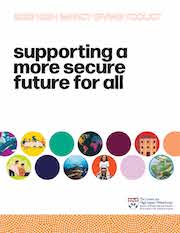Publication Date: February, 2012
Publication Date: March, 2008
... common problem areas, exceptions, penalties, and resources. Self-Dealing: A Concise Guide For Foundation Board ...
... against the power imbalances and racial inequities in philanthropy, nonprofits, and government. Steering Committee ...
... their federal lawmakers in Washington. Presented by United Philanthropy Forum , the gathering brings foundation leaders ... to discuss key issues of importance to foundations and philanthropy. The Council of New...
... for an effective response? CNJG helped create the Disaster Philanthropy Playbook after Superstorm Sandy in 2012 and uses ... strategies for effective grantmaking that matches resources to needs and avoids duplication...
... The grants, totaling $1,035,205, were awarded to 26 nonprofit organizations in 2023. It marks the fifth year ... Foundation Trustee. "We believe that the capacity building resources approved by the Bunbury Fund...
... the country for Foundations on the Hill on February 23-26. The event included a policy conference followed by ... an opportunity for us to discuss issues of interest to philanthropy, advocate for policy and...
Publication Date: April, 2014
Nonprofit Finance Fund's Annual Survey chronicles the challenges facing the nonprofit sector and calls out some of the targeted investments we can start to agree...
Joint Statement from CNJG and the Center for Non-Profits
This statement also appeared on...
... on many New Jersey communities, CNJG has gathered numerous resources, articles, and information on the philanthropic ... Response listserve for members to share information and resources, coordinate on funding, and...
Publication Date: July, 2021
Two different CNJG members queried the CEO listserve on how/when/how to return to the office following the COVID-19 pandemic. CNJG staff compiled the answers from the responding members removing identifying information of the respondents.
... same level of services, nonprofits will seek additional resources from the philanthropic sector to make up the difference. Therefore it is imperative that philanthropy remains active in the conversation between ......
Publication Date: October, 2013
This research brief summarizes early findings from a survey commissioned by Enterprise Community Partners, Inc. to measure the ongoing impact of Hurricane Sandy, one year after the storm made landfall. Based on a representative sample of households in...
Publication Date: November, 2023
This document provides strategies for high-impact philanthropy, including examples of nonprofits using effective approaches. It also includes resources for due diligence, advancing equality, ...
... might engage in response and recovery efforts. Resources The Center for Disaster Philanthropy has created a Hurricane Dorian disaster ... on the areas of greatest need The Center for Disaster Philanthropy...
Publication Date: June, 2020
... member queried the corporate listserve on strategies or resources for virtual volunteering. CNJG compiled these ...
Publication Date: October, 2015
What comes after “strategic...?” If you said, “planning,” you’re not alone. And for many leaders of community foundations, especially small ones who don’t have the time or money for a big process, anxiety is the feeling that follows. If that’s the...
... over the coming months and years will directly impact philanthropy’s ability to foster equity, champion the vital ... and will take place in Washington, D.C. from February 23 - 26. Presented and hosted by United...
Publication Date: April, 2025
This weekly funder briefing webinar series welcomed New Jersey-based grantmakers along with national funders and provided an opportunity for grantmakers to hear from a wide range of nonprofit experts. This series started on March 13, 2025, less than a...
Publication Date: January, 2018
... Alliance Magazine has been the leading magazine for philanthropy and social investment worldwide providing news ... Alliance magazine to offer our members and your members a 20% discount on new print and digital...

